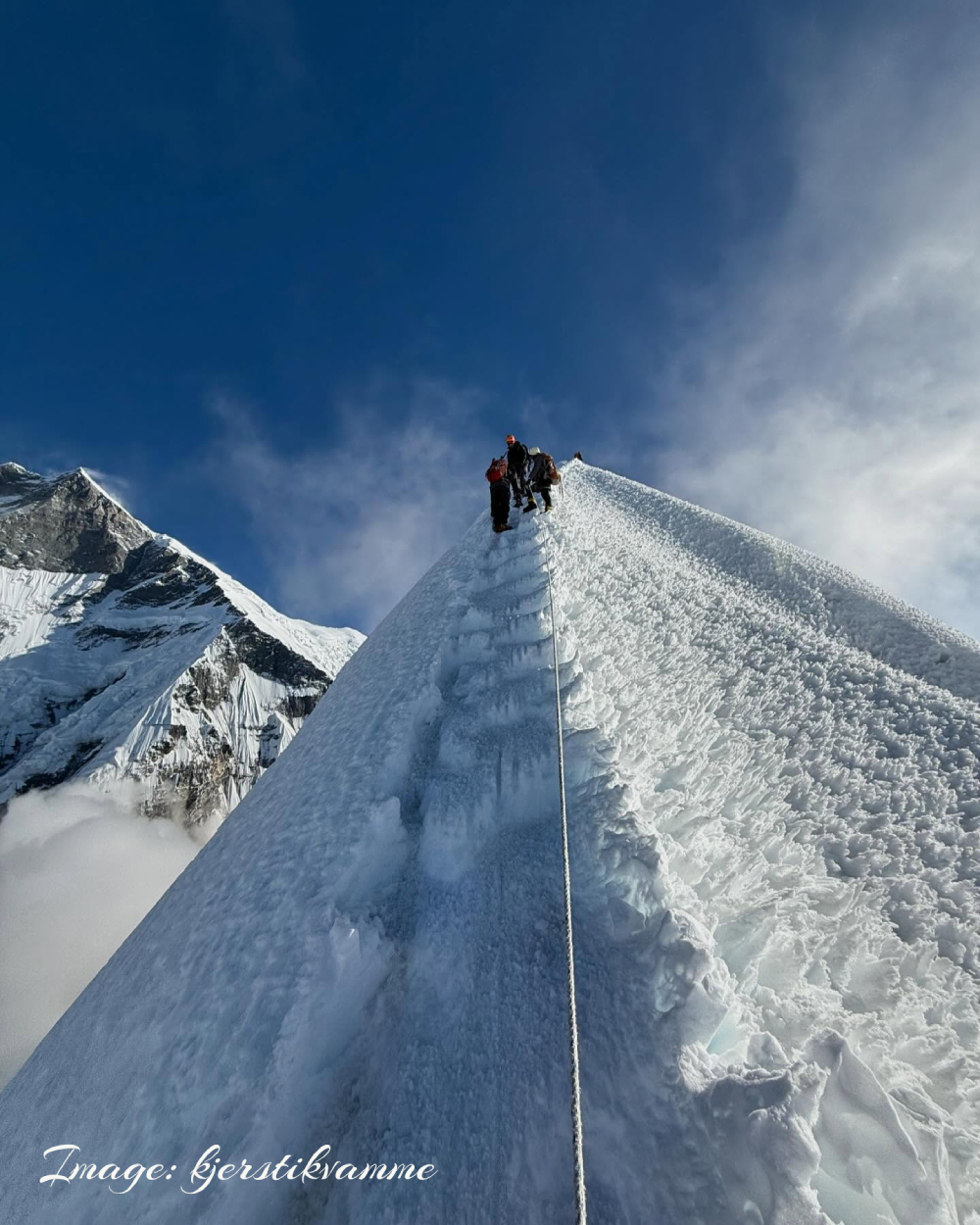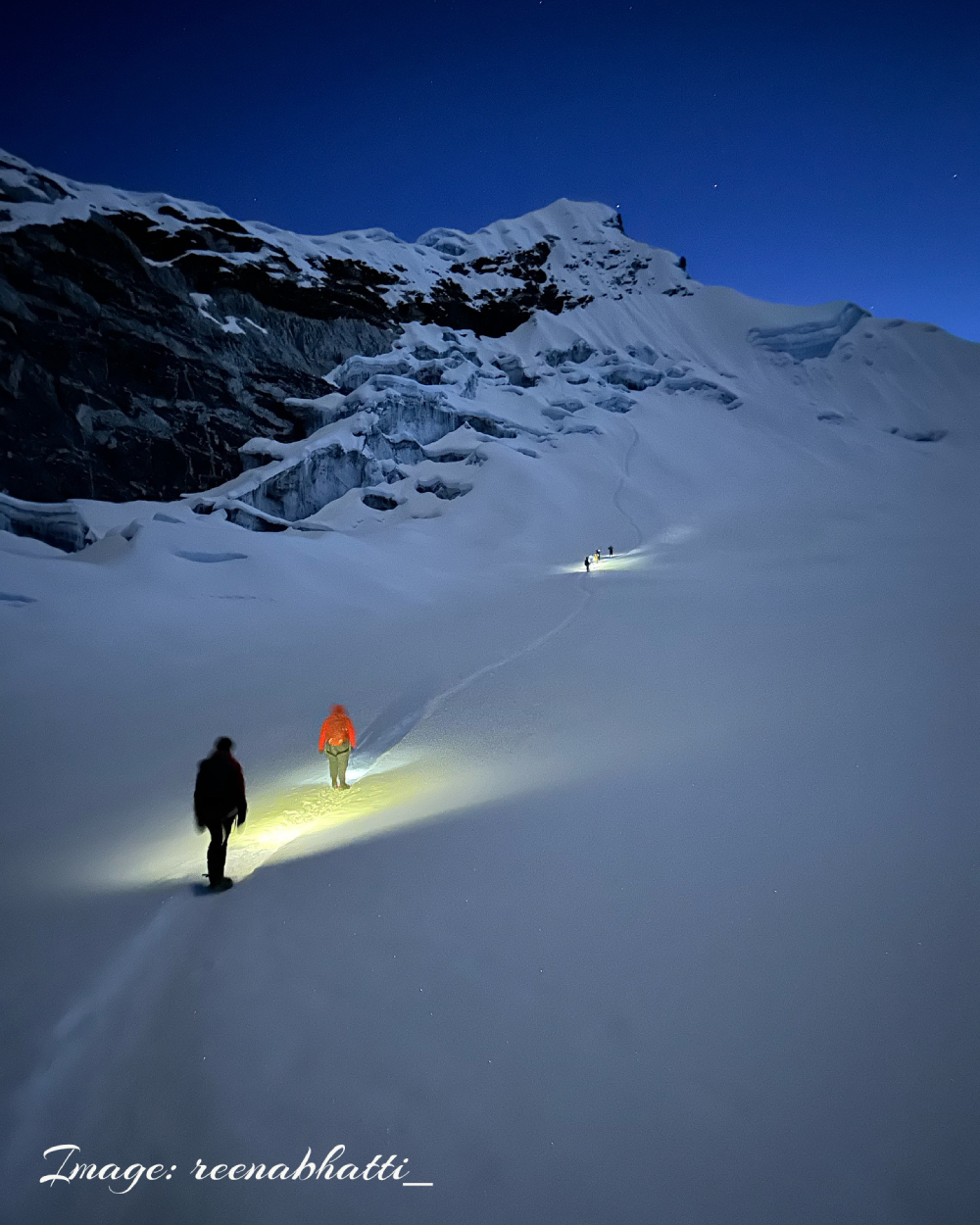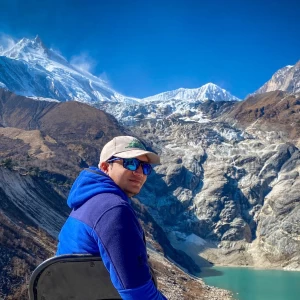Plan your adventure with clarity! Discover the costs involved in climbing Island Peak and learn how to budget effectively for your journey. Read more!
How Much Does It Cost to Climb Island Peak?
Table of Contents
Island Peak, also known as Imja Tse, stands at an impressive 6,189 meters (20,305 feet). It is one of the most popular trekking peaks in Nepal, offering stunning views of Mount Everest, Ama Dablam, Cho Oyu, Makalu, and Lhotse.
Many climbers go for the Island Peak summit as a stepping stone to higher peaks like Everest. This is because it provides a thrilling challenge without the extreme technical difficulties of the tallest mountains.
The average cost to climb Island Peak ranges from $2,500 to $4,000. This cost includes permits, guide and porter fees, accommodations, food, and transportation. Prices can vary depending on whether you join a group or opt for a private expedition.
The Island Peak climbing cost is also influenced by factors such as the type of services you select, like luxury lodges or basic teahouses. It's important to plan your climb well to ensure a safe and successful journey.
This article provides detailed information about the Island Peak expedition cost, helping you plan your journey and budget effectively.
Also, check Tours and Trekking in Nepal

What Is Island Peak?
Island Peak, also called Imja Tse, is a trekking peak in the Everest region of Nepal. It is 6,189 meters tall. The trekking peak is located in Sagarmatha National Park, near the Everest Base Camp Trek route. It is famous for being an accessible and thrilling climbing destination. The name “Island Peak” comes from its appearance as an island surrounded by ice.
Climbing Island Peak offers a challenging but rewarding experience. Climbers must cross glaciers and climb steep snow and ice sections. Basic mountaineering skills, like using ropes and crampons, are necessary. Reaching the summit provides stunning views of Mount Everest, Lhotse, and Makalu. It is a great choice for those starting their Himalayan mountaineering journey.
Who Can Climb Island Peak?
Island Peak is a popular climbing destination for adventurers seeking a high-altitude challenge. It is suitable for beginners with basic trekking experience and climbers eager to gain mountaineering skills. Understanding the requirements is crucial for a safe and successful ascent.
Climbers should have basic trekking and climbing skills. These include walking on uneven terrain and using gear like crampons. Previous high-altitude trekking experience is highly recommended. It prepares climbers for the challenges of thin air and cold conditions.
Physical fitness is a key requirement to climb Island Peak. Climbers need good stamina for long ascents and steep climbs. Strength training and regular cardio exercises are recommended before the expedition. Strong legs and lungs help manage the demanding climb.
Acclimatisation is equally important to prevent altitude sickness. The route to Island Peak includes acclimatisation days to adjust to the altitude. Proper acclimatisation increases success rates and ensures safety during the climb.

Breakdown of Costs to Climbing Island Peak
Island Peak climbing requires careful financial planning. Expenses vary depending on the season, services, and personal preferences. Understanding the key cost components helps climbers budget effectively and avoid surprises. Below is a detailed breakdown of the main costs associated with the climb.
Permit and Registration Fees
To climb Island Peak legally, climbers must obtain multiple permits. The Island Peak climbing permit costs $250 during spring and autumn. These are the peak climbing seasons when conditions are favourable. The permit fee drops to $125 during off-season months.
Additionally, you’ll need a Sagarmatha National Park entry permit, which costs around $30, and a Khumbu Pasang Lhamu Rural Municipality fee, which is $20. Hiring a licensed guide is mandatory and ensures compliance with local regulations while improving safety.
Transportation Costs: Getting to Lukla
The Island Peak Climbing trip starts from Lukla. Lukla itself is the gateway to the Khumbu region. A one-way flight from Kathmandu to Lukla costs approximately $200–$250 per person. This scenic 30-minute flight is the most common way to reach Lukla. During peak seasons, early bookings are recommended to secure your seat.
For budget-friendly options, a flight from Manthali to Lukla costs around $150–$200 but involves a long drive from Kathmandu to Manthali. Helicopter services, costing $500–$1,000 per person, provide a faster, luxurious alternative.
For those preferring overland travel, a jeep to Salleri and Thamdanda, followed by trekking to Lukla, costs $350 at least for the private option. On sharing, not always sure of the transport but can range from around $80 per person. This adds several days to the journey but can save on costs.
Trekking to Island Peak Base Camp
Reaching the base camp involves a multi-day trek from Lukla. This trek typically takes 4–5 days, passing through villages like Namche Bazaar, Tengboche, and Dingboche. Costs include food, accommodation, and hiring support staff.
Guide Costs: Hiring a guide ensures safe navigation. The daily rate is $30–$40, including their meals and lodging. Guides are invaluable for their local knowledge and managing logistics.
Porter Costs: Porters charge around $25–$30 per day. They can carry up to 25 kg, making your trek more comfortable.
Combined, these services cost $200–$250 for a standard trek to the base camp.
Accommodation Costs
Accommodation in the Everest region primarily involves teahouses, which are simple lodges offering basic amenities.
Cost Range: Rooms cost $5–$10 per night in lower villages like Lukla or Namche Bazaar. Near the base camp, rates increase to $15–$20 per night, especially during peak trekking months.
Seasonal Impact: Prices can rise by 20–30% in spring and autumn due to higher demand. Off-season prices are more affordable.
Most teahouses charge extra for amenities like hot showers ($5–$7) and Wi-Fi ($3–$5 per hour). Budgeting for these add-ons ensures a smoother experience.
Food and Water Expenses
Staying energized during the trek is vital. Teahouses offer meals tailored to trekkers, but prices increase with altitude.
Meal Costs: Meals cost $5–$8 per dish in villages like Lukla. At higher elevations, prices rise to $8–$12 due to transportation challenges.
Daily Budget: Expect to spend $25–$35 per day on food and drinks. Dal Bhat, a traditional Nepali dish, offers unlimited servings and is highly recommended.
Water Costs: A litre of boiled water costs $1–$3, depending on the altitude. To save money, bring a water purification system or tablets.
Climbing Sherpa Guide and Porter Charges
The climbing peaks are never perfect even though you are a group of experienced climbers but do not have a Climbing Sherpa with exhilarating climbing experience. These Sherpa climbers fix the climbing rope and teach the climbing techniques so that you know even the technical climb. They start their guidance from the base camp to the summit through the Island Peak High Camp and back.
Guide Daily Rate: A licensed climbing guide charges $50–$70 per day, which includes food, lodging, and insurance.
For a 15-day trek and summit climb, expect to spend $700–$900 on guide and porter services combined. We bundle these costs into our packages for convenience.
Additional Costs to Consider
Several additional expenses may arise during the trip. These include purchasing snacks, charging electronic devices, and using Wi-Fi at teahouses. Charging devices cost $2–$5 per hour as you climb higher.
Wi-Fi is available at $5 with a card username and password in most villages. Hot showers are optional and cost $5–$7 per use at higher altitudes. Additionally, personal expenses like souvenirs or donations at monasteries can add up, so carry some extra cash.
Gear and Equipment Rentals
If you don’t own climbing gear, renting in Chhukung rather than Kathmandu is a practical and affordable solution. This is because the airlines that fly to Lukla only let you carry 15 kg of luggage. Gear like crampons, ice axes, harnesses, mountaineering boots, and helmets are mandatory for Island Peak. Renting a complete set of climbing equipment costs around $100–$150 for the entire trip.
Sleeping bags and down jackets, essential for cold nights, cost $1–$2 per day. Ensure all mountaineering equipment is inspected and tested for safety before use.
Tips for the Staff Accompanied
Tipping is a significant part of the trekking culture in Nepal. It shows appreciation for your team’s hard work. Guides typically receive $15–$20 per day, while rest staff are tipped $5–$10 per day.
Tipping is not just a courtesy; it also helps support local livelihoods.
Optional Add-Ons for Comfortable Island Peak Climbing
Adding optional services to your summit of Island Peak can improve comfort and convenience. These include hiring private guides, and porters, or using private camps. Private guides offer personalised attention and better safety.
Porters lighten your load, making the trek easier. Choosing private camps ensures a quieter and more comfortable rest compared to shared options.
The cost for a private guide ranges from $40–$50 per day, while a porter costs around $25–$30 per day. Private camping services can add around $500 to your trip, depending on the duration and provider. These add-ons allow you to focus on the climb while enjoying added comfort.
Garbage Deposit
During Island Peak Climbing, the Garbage deposit is collected by the Nepal Mountaineering Association. It is USD 500 per climbing permit issued. This money is for keeping the mountaineering trails clean, collecting garbage, cleaning the trails, and preserving the Himalayas of Nepal. Remember, for every peak climbing adventure, the same but separate fee is collected.
Summary of Estimated Total Costs
Planning for Island Peak climbing requires understanding total expenses to avoid surprises. Costs vary based on group size, trip duration, and additional services. Having an overview helps you set a realistic budget.
The estimated total cost of Island Peak climbing ranges between $2,500–$4,000. This includes permits, transportation, accommodation, and guide services. Opting for private add-ons or higher-quality gear may increase expenses. Careful planning and budgeting ensure you enjoy a comfortable and successful climb without financial stress.
Added further trekking to Everest Base Camp
Climbers also add their Island peak climbing toward Everest Base Camp. The Everest Base Camp Trek when added to the climbing, starts from Island Peak Base Camp. Combining these two amazing adventures helps you explore the Everest Region. This adds USD 500-600 per person to the total trip cost.
Conclusion
As a whole, the cost to climb Island Peak comes in the range of USD 2,500 to 4,000.
Climbing Island Peak is an unforgettable adventure, but proper planning and understanding costs are essential. From permits to accommodation and optional add-ons, knowing the expenses helps you prepare better.
This journey offers breathtaking views and a sense of accomplishment. Take the leap, embrace the challenge, and experience the thrill of conquering Island Peak. With the right preparation and budgeting, your dream climb is within reach.

